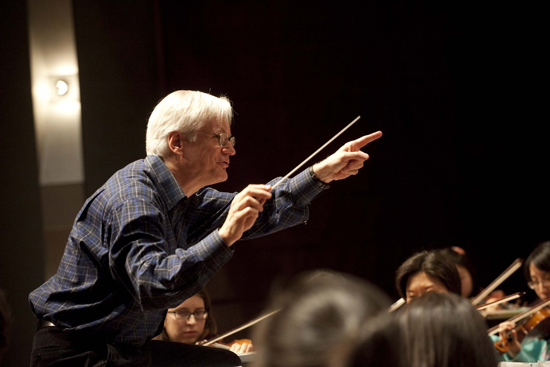Rachmaninoff’s Bells Resounds at Symphony Hall
BU Symphony Orchestra, Symphonic Chorus perform tonight

David Hoose will conduct the BU Symphony Orchestra and Symphonic Chorus in two rarely performed works by Sergei Rachmaninoff and Dmitri Shostakovich tonight at Boston’s Symphony Hall. Photo by Kalman Zabarsky
When accomplished baritone Anton Belov was a child in Moscow, one of his favorite recordings was Sergei Rachmaninoff’s The Bells. A choral symphony scored around a freewheeling Russian translation of a poem by Edgar Allan Poe, the piece was composed in 1915, but acquired political baggage in the Soviet years, when its composer was denounced as an enemy of the revolution. “It’s just an amazing piece, transformative,” says Belov (CFA’91), a soloist at the Rachmaninoff and Shostakovich program being performed by the Boston University Symphony Orchestra and Symphonic Chorus tonight at Symphony Hall. Titled Requiem for a Generation, the concert is directed by David Hoose, a College of Fine Arts professor of music and director of orchestral activities.
Although Rachmaninoff called The Bells one of his two favorite compositions, the piece is performed rarely because of its lavish instrumentation. Boston audiences haven’t heard it since 1979. “There’s nothing like standing in front of that ginormous orchestra and choir,” says Belov, who prepared the score for tonight’s choral performance. In addition to a mixed chorus and soprano, tenor, and baritone soloists, the orchestra for tonight’s concert is outsized, with trios of oboes, clarinets, bassoons, trumpets, flutes, and trombones, as well as six horns and two harps.
In the second of their annual Symphony Hall concerts, the orchestra and chorus will also perform Shostakovich’s Symphony No. 11, composed in 1957 and never before performed in Symphony Hall. Both works were selected to commemorate the generation of Russians born after the Russian Revolution of 1905. A lecture by Patrick Wood Uribe, a CFA assistant professor of musicology and ethnomusicology, precedes the concert, which will be webcast live on the CFA virtual concert hall website. The two pieces, particularly the Shostakovich, its musical imagery conjuring bloody, historic upheaval, reflect the theme of violence, this year’s CFA keyword initiative.
The Bells and Shostakovich’s “searing, rousing memorial to victims of national oppression may be a perfect pairing,” says Hoose, who worked with Ann Howard Jones, a CFA professor of music and director of choral activities, in rehearsing the chorus. “Each work reflects its own journey: The Bells, the entirety of life from youthful vigor to the inexorable pull of death,” and the Shostakovich, “from breath-holding misery to irrepressible excitement and then terror, through grieving, and ultimately, into defiance.”
In addition to Belov, a Juilliard graduate with a PhD from BU, whose extensive credits with opera companies around the country include Count di Luna in Il Trovatore, Escamillo in Carmen, and Figaro in Le Nozze di Figaro, The Bells features as soloists soprano Janna Baly, who has appeared with the Boston Symphony Orchestra, and tenor Yeghishe Manucharyan (CFA’01), a rising star who has performed at the Metropolitan Opera, Boston Opera, and Carnegie Hall. Manucharyan has sung main roles in operas by Verdi, Puccini, Gluck, Mozart, Rimsky-Korsakov, and others. “I have sung in Boston’s Symphony Hall many times,” he says, “and look forward to returning.”
The Boston University Symphony Orchestra and Symphonic Chorus concert Requiem for a Generation takes place tonight, Monday, April 2, at 8 p.m., at Symphony Hall, 301 Massachusetts Ave., Boston. A preconcert lecture by Patrick Wood Uribe begins at 7:15 p.m. Tickets are $25 for general admission; student rush tickets are $10, available at the door today from 10 a.m. to 6 p.m. Members of the BU community may get one free ticket at the door on the day of the performance. Purchase tickets here, or call 617-266-1200.
Comments & Discussion
Boston University moderates comments to facilitate an informed, substantive, civil conversation. Abusive, profane, self-promotional, misleading, incoherent or off-topic comments will be rejected. Moderators are staffed during regular business hours (EST) and can only accept comments written in English. Statistics or facts must include a citation or a link to the citation.